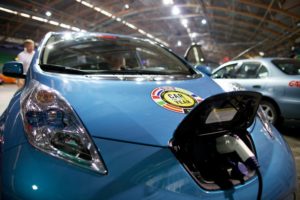Norway, India, and other countries begin to ban conventional vehicles.
By George Harvey
It has actually been over a year since India, Norway, and the Netherlands started getting serious about banning vehicles that were entirely powered by gasoline or diesel oil. The Netherlands announced in December that all new cars would be zero-emission, and no new residential natural gas hookups would be allowed, starting in 2035. India followed by announcing in April that no new combustion vehicles would be allowed, starting in 2030. And Norway has multiplied the number of electric vehicles (EVs) by five in less than two years.
At the end of June and early July of 2017, however, there was a spate of positive news on electric vehicles.
On June 30th, Vermont electric utility Green Mountain Power announced record sales were being achieved through a $10,000 rebate program it was running for Nissan Leaf EVs purchased through Freedom Nissan in South Burlington. The program was extended through September 30th.
On July 5th, Volvo announced it would no longer be making cars powered by combustion-only engines, starting 2019.
At almost the same time, word came that the United States had seen EV sales, for those makers that report monthly, nearly double in the first six months of 2017 from what they were in 2016. Tesla’s sales are not reported monthly, so they were not part of the record.
And at almost the same time, France announced plans to ban all combustion-powered cars by 2040; it also said it would ban the use of coal at the same time.
Not long after those developments, Royal Dutch Shell announced that it would spend $1 billion per year on its New Energies division, because it was seeing the movement away from oil and toward renewable power. This division deals with liquefied natural gas and other combustion fuels, which Shell says will be needed to power heavy transportation and air travel. Nevertheless, it is also looking into possibilities for hydrogen fuel cells and other alternative fuels.
On July 10th, Vermont’s Washington Electric Co-op, a 100% renewable, 100% member-owned electric utility serving communities in north-central Vermont, announced a program very much like that of Green Mountain Power. Its members are eligible to receive incentives totaling $10,000 on the purchase of a new 2017 Nissan Leaf all-electric vehicle from Freedom Nissan in South Burlington.
On July 26th, the UK also announced a ban on new cars powered by gasoline and diesel oil. The complete change is effective in 2040.
Interestingly, the transportation company Lyft was inspired by President Donald Trump’s withdrawal from the Paris Climate Agreement to set a goal of one billion rides shared per year. Less than two weeks before, Lyft had announced that its autonomous car program would run entirely on EVs.
Clearly, there is a fundamental shift in transportation underway and gaining momentum. It would probably be a good idea for anyone who is interested in buying a car to give thought to what fuel it will run on. In years to come, combustion fuels for transportation will almost certainly see unexpected changes in price and availability.









Leave a Reply